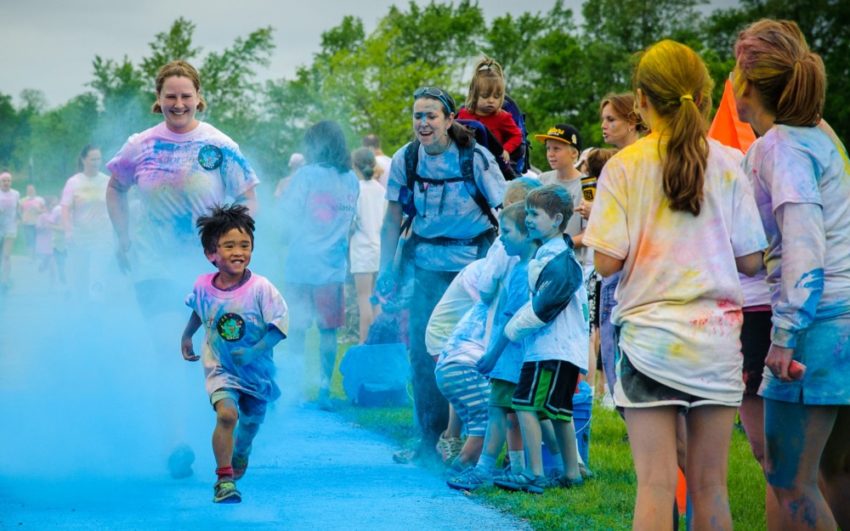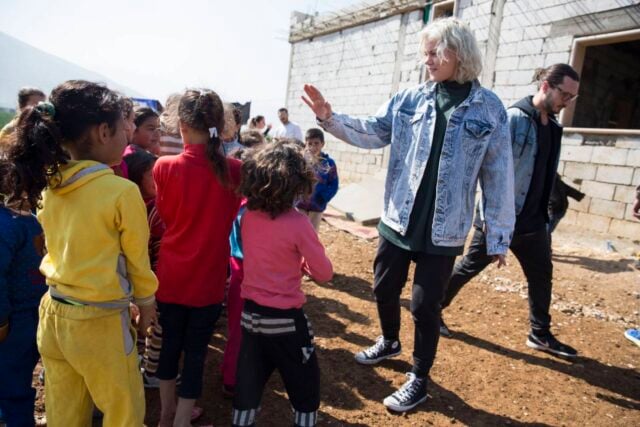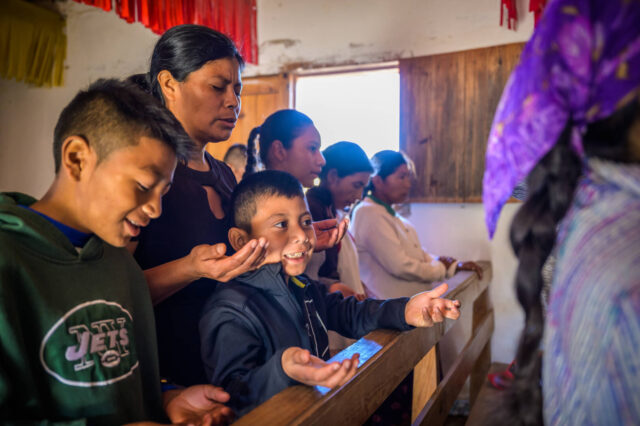Both the young and old are using the gifts God gave them to help families living in poverty around the world — becoming change agents in their families, churches, and communities. Read their stories:
- Elizabeth Johnson – Gift Catalog, disaster relief
- Nathan VanHoudnos – Fundraise for Nepal
- Salina and Michael Dayton – Child Ambassadors
- Villers family – Gift Catalog
- Ferretti family – Economic empowerment
- Shaw family – Child Sponsorship
- Rev. Jim Adams – Gift Catalog
- Knobloch family – Gift Catalog
- Bronx motorcycle club – U.S. programs
- Ignite F.C. – Gift Catalog
- Cross Connection Community Church – Gift Catalog
- World of Life Chapel – 30 Hour Famine
- Jean Estep – Gift Planning
- Jacob Froats – Water, livestock
- Davis family – Malaria Sunday
Change agent: Elizabeth Johnson
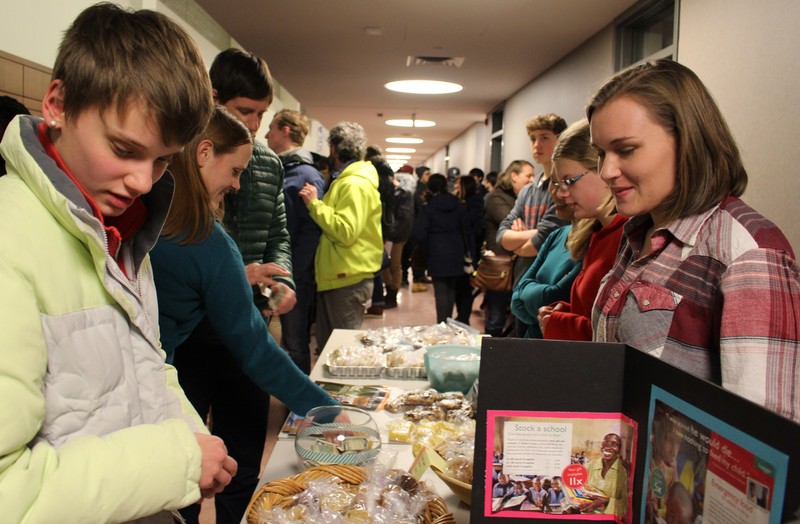
Hometown: Ithaca, New York
Program: Gift Catalog, disaster relief
Published Nov. 15, 2015
Shortly after Elizabeth Johnson turned 13 in 2009, the World Vision Gift Catalog arrived at her house in Ithaca, New York, and she started leafing through it. Her father suggested she and her friends pool their money and purchase some items.
“I brought the catalog to church and said, ‘If you have a few dollars or your allowance to help out, that would be great,’” Elizabeth says. “I was not expecting to collect $136, but we did.”
With the funds, they bought a goat, two chickens, a mosquito net, and three ducks. Elizabeth says the livestock caught her eye first. “The farm animals can multiply,” she says. “It’s a good investment for the family because it will help them for years.”
After the group’s success, she thought they could make it an annual tradition.
But just a few weeks later, the massive 2010 earthquake rocked Haiti. Elizabeth and her friends dedicated themselves to raising relief funds. They held a bake sale and raised $550. Then at a yard sale that summer they raised more than $1,000.
At that point, Elizabeth knew they were on to something.
Since then, she and about 15 friends, ranging in age from 8 to 17, have held bake sales and yard sales each year, along with other fundraisers. “We encourage each other to keep doing it,” she says. Collectively, they’ve raised $7,000 for disaster relief and World Vision Gift Catalog items.
“I’ve learned to trust in [God], however the fundraising efforts go,” she says. “He knows where the money is going. Whenever we make a donation, we’re just trusting in him for the money to be used to the maximum it can be and [that] everything will fall into place when we’re organizing the events.”
Now 17 and about to start her senior year, Elizabeth is looking at colleges and anticipating that her fundraising experience will apply when she studies accounting. Before she goes, she plans to pass the torch to her three younger siblings and the kids at her church, encouraging all young people to get involved.
“Any amount makes a difference,” she says. “You don’t have to work alone. You can work as a team, and that’s one thing that’s really helped us. Don’t get discouraged, even if you don’t meet your goal on a specific fundraising event, because you’re still making a difference with every single penny you raise.”
Change agent: Nathan VanHoudnos
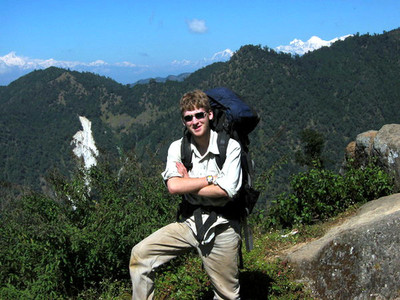
Hometown: Evanston, Illinois
Program: Fundraise for Nepal
Published June 15, 2015
In 2002, Nathan VanHoudnos was a physics major at University of Illinois at Urbana-Champaign when he packed his bags and flew to Nepal. Hired as a research assistant to a geology professor, Nathan and a group of American and Nepali scientists spent three months installing seismometers — devices that measure tremors across the earthquake-prone country.
As his team worked with farmers to place equipment on their land, “I got to see a lot of Nepal that people don’t normally get to see — the more rural areas, where people are doing their best to be farmers and live,” says Nathan, 32, who returned to the country in 2004 for another three months. “It was a transformative experience for me, because I’d never really met someone who was living in a-dollar-a-day kind of poverty.”
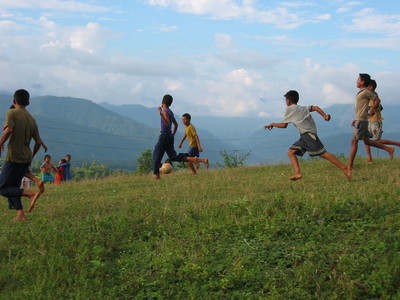
When the 7.8-magnitude earthquake struck Nepal in April, Nathan, now a statistician at Northwestern University, knew he wanted to help. “My first reaction was, ‘Oh no, this is going to be terrible,’ and my second reaction was, ‘Let’s pray and let’s help.’”
After a bit of research, Nathan and his wife, Kara, decided to donate to World Vision’s earthquake response in Nepal. They’d given to World Vision in the past, and “it was good to know that [World Vision] has a long-standing presence in Nepal,” says Nathan. “The day of the quake 200 people were already on the ground. To me, that means a lot.”
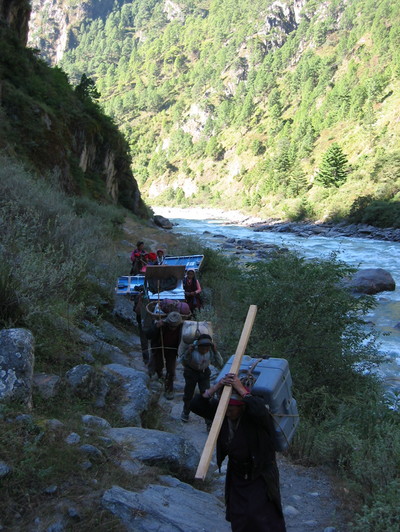
But he wanted to do more. “The easiest way for me to give more and have more impact was to do the [peer-to-peer] fundraising,” says Nathan. He created a page with his story at mycause.worldvision.org and shared it with friends and family. To date, he’s raised more than $1,300 of his $5,000 goal.
“There’s no way my wife and I could have given that gift out of our pockets,” he says. “So the idea that we could do this sort of fundraising in this way has been a very positive thing. There’s no way we could have had this impact otherwise.”
Nathan’s time in Nepal had a lasting effect, helping him realize how blessed and comparatively wealthy he and most Americans are. He says, “A little bit of our material wealth can make a big difference in places where people are poor.”
Change agents: Salina and Michael Dayton
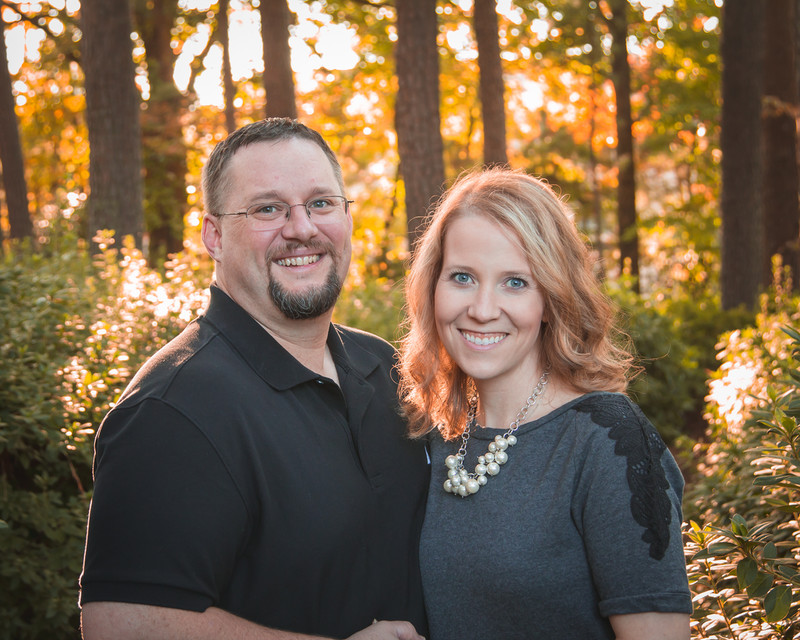
Home: Raleigh, North Carolina
Program: Child Ambassadors
Published May 15, 2015
When Michael and Salina Dayton began sponsoring two children with World Vision in 2009, it triggered a domino effect. A year later, when their first daughter was born in December, they sponsored another child born the same month, in part so they had a way to teach their daughter about poverty as she and their sponsored girls grew older.
In 2014, Salina met a World Vision Child Ambassador who spoke passionately about not just sponsoring children but engaging with them. Wanting to build a stronger relationship with her sponsored children, Salina went to myworldvision.org and read The Hole in Our Gospel to learn more. In the process, a photo of another little girl captured her heart, and they sponsored this child as well.
The family now writes bi-monthly letters, and Salina is equipped to share more about their sponsored children with her own children. Her two daughters already ask for donations at birthday parties, sell artwork to buy goats, and share their allowance money to provide chickens.
We talk about money not in terms of actual dollars but in terms of how much support we could provide for our ‘World Vision girls.—Salina Dayton
“We talk about money not in terms of actual dollars but in terms of how much support we could provide for our ‘World Vision girls’ — instead of buying that one toy,” Salina says.
As her passion for sponsorship grew, Salina began sharing her enthusiasm for sponsorship on social media and soon volunteered as a child ambassador to encourage others to sponsor children. In this role, Salina says she’s able to “help sponsors experience the joy of truly making a difference in the life of one child at a time.”
Among those Salina’s message has reached is Joelle Howland, who also sponsored a child. “What intrigued me most was [World Vision’s] approach in supporting communities as a whole and helping them sustain and become self-sufficient,” Joelle says.
Now, during the holidays, Joelle and her husband, Craig, use the World Vision Gift Catalog to talk with their daughters about poverty. Together, they select items from the catalog to further help children living in poverty.
Joelle says, “It’s been very rewarding for them to see that they’ve had the ability to make a difference, and their commitment to giving continues to grow.”
Change agents: Villers family
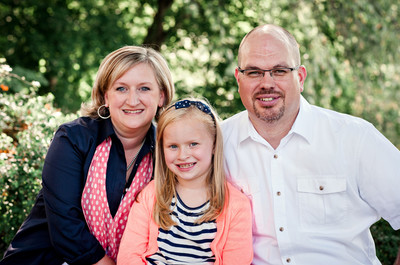
Hometown: Chagrin Falls, Ohio
Program: Gift Catalog
Published Oct. 15, 2015
Tracy Villers has a heart for giving. “My husband, Jeff, often chides me that I would give away the kitchen sink if he let me, and he might be right,” she says.
The couple sponsored their first child through World Vision in 2009. Since then, their family of sponsored children has grown to include two girls, from Bolivia and Honduras, and two boys — one in Zambia and another in Mali, “who shares a birthday and a love of soccer” with their 8-year-old daughter, Mackenzie.
Last Christmas, the Villers decided to give in an even bigger way than usual. The women in their extended family traditionally exchange small gifts on Christmas Day, and “every year, I would inwardly groan at the prospect of having to add this task to my to-do list, because I didn’t feel that the gifts expressed what they were originally intended to express,” says Tracy.
At Thanksgiving, she proposed an alternative: Instead of giving among themselves, the women would use their time and money to give to others through the World Vision Gift Catalog.
They collected $851, several times what Tracy expected. After sharing the news with family on Christmas Day, other family members also contributed to the total.
Together they purchased the “Dairy Trio” from the Gift Catalog — a goat, a cow, and a sheep. “It was especially meaningful to us because we are a farm family,” says Tracy. “Grandma and Grandpa’s dairy farm still stands, even though they have passed on. It’s a blessing to know that somewhere, another family’s life will be changed because of the Lord’s generosity in our own family.”
Change agents: Ferretti family
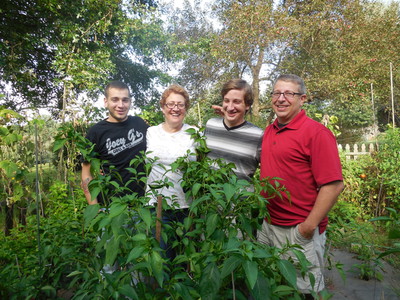
Home: New York City
Program: Economic empowerment
Published August 18, 2014
When it comes to creative fundraising, the Ferretti family has discovered a sizzling commodity. Eight years ago, the New York City family made three bottles of hot sauce from a kit their sons, Andrew and Luke, received as a gift. The next year, they grew enough hot peppers to make 12 bottles. The tiny business continued to grow, and Hot Sauce 4 Good produced more than 1,000 bottles in 2013.
Bob was elated as his homemade sauce grew in popularity, but he had no intention of keeping the profits. He and his wife, Laurie, sponsor two children through World Vision, so they decided to use the funds to also support budding entrepreneurs in developing countries.
World Vision provides start-up funds to people in impoverished communities who have business ideas but no access to loans to follow through on their dreams. As borrowers repay their loans, the funds are recycled to help other business owners.
Bob’s family, which has supported eight entrepreneurs, prefers to find people with agriculture or pepper-growing ideas. “My wife and I have been blessed in our life, and we find the greatest joy when we have the opportunity to do something good for others,” Bob says. “In a small way, this is our faith in action.”
Change agents: Shaw family
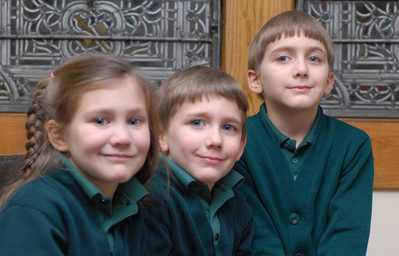
Home: Muncie, Indiana
Program: Child sponsorship
Published April 24, 2014
When Jonathan Shaw was 4, he was saddened as he watched news of the 2010 Haitian earthquake. For days, Jonathan asked his mother, Sarah, who would help people in need.
Seeing his deep concern, Sarah and Jonathan’s dad, Brian, sponsored a Haitian boy Jonathan’s age. But because Brian was out of work at the time, they also searched for a way Jonathan could raise the sponsorship support.
Sarah thought the family could use her pottery experience to make and sell coffee cups — and soon Cups for Kids was born. In four years, the family has sold several hundred cups at local events and online.
Today, 9-year-old Jonathan says of his sponsored child, “I like being a friend to him.” Sarah says the family has learned from this experience. “Often you think, ‘I can’t do anything.’ Whether you’re a little kid or an adult, everyone can contribute in some way.”
Now Jonathan’s younger siblings, Hannah, 7, and Andrew, 5, also are involved, and Hannah is sponsoring a girl in India. Brian says, “It makes me feel good that we can pull together as a family and make an effort out there in the world.”
Change agent: Rev. Jim Adams
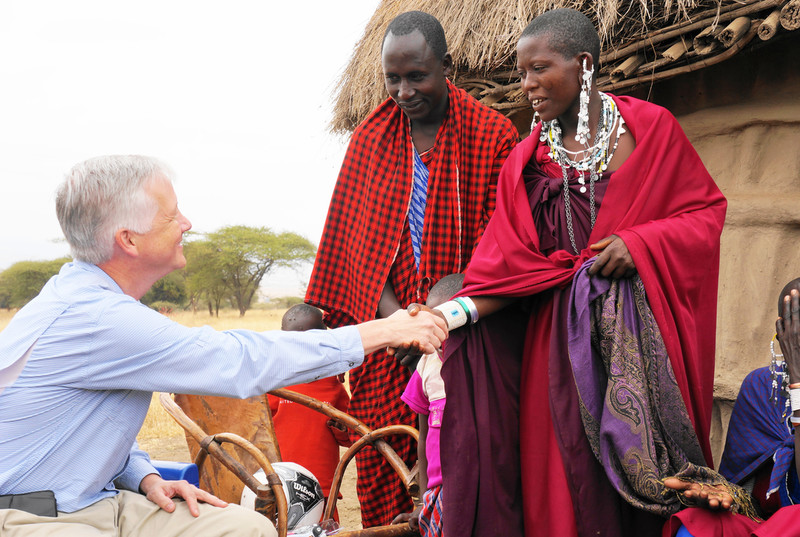
Hometown: Raleigh, North Carolina
Program: Gift Catalog
Publish Jan. 10, 2014
When the Rev. Jim Adams gives a wedding gift, he writes on the card, “You may get two toasters, or you might get two sets of candlesticks, but you won’t get two pigs.”
As a minister, he isn’t obligated to give presents when he officiates weddings, but about 10 years ago, he performed a wedding for a couple he knew well, so he felt a gift was appropriate. Jim didn’t want to simply buy another registry item — so he gave livestock instead.
Today, because he thinks highly of World Vision’s work and accountability, he always chooses a wedding gift of a pig, sheep, or goat from the World Vision Gift Catalog. The couples appreciate the unique present and have even sent him notes thanking him for helping them see beyond themselves.
“It enlarges your heart to give like that, and it has the potential to do that for the other person as well,” Jim says of his gift giving. “What someone gives you for a gift tells you what they think of you.
“There’s some kind of respect that comes when you give someone something from the World Vision Gift Catalog. You’re saying, ‘I think you’re the type of person who would appreciate this.’”
Change agents: Knobloch family
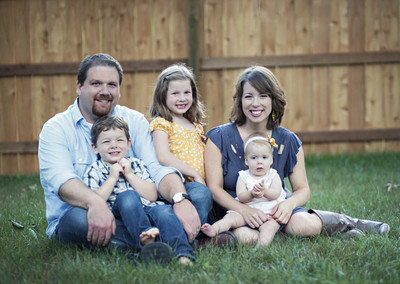
Home: Normal, Illinois
Program: Gift Catalog
Published Oct. 16, 2013
As Christmas approached last year, Matt and Summer Knobloch wanted to teach their children — Charlotte, Clive, and Cora — the true spirit of Christmas. Even though family finances were tight, they started a “servant’s jar.” When Matt or Summer “caught” the children serving someone, they put loose change in the jar. The couple planned, on Christmas Eve, to match whatever the children earned, and the family agreed to spend the funds on items in the World Vision Gift Catalog. When Dec. 24 arrived, the change and match totaled $26, but they couldn’t decide on a gift.
A few days later, Charlotte, then 6, decided she would make and sell bookmarks for 25 cents each to financially help the family. Touched, Summer suggested Charlotte instead put the money toward their still-undecided World Vision gift for a family in need. Through a boost from Summer’s Facebook friends, Charlotte’s sales brought the combined fundraising to $200.
But God still wasn’t done. In the last week of sales, a local business owner matched this new amount — bringing the total up to $400. Summer says, “We are so amazed to look back at the hand of God in all of this. There are no limits to what God can do!”
Change agents: Bronx motorcycle club
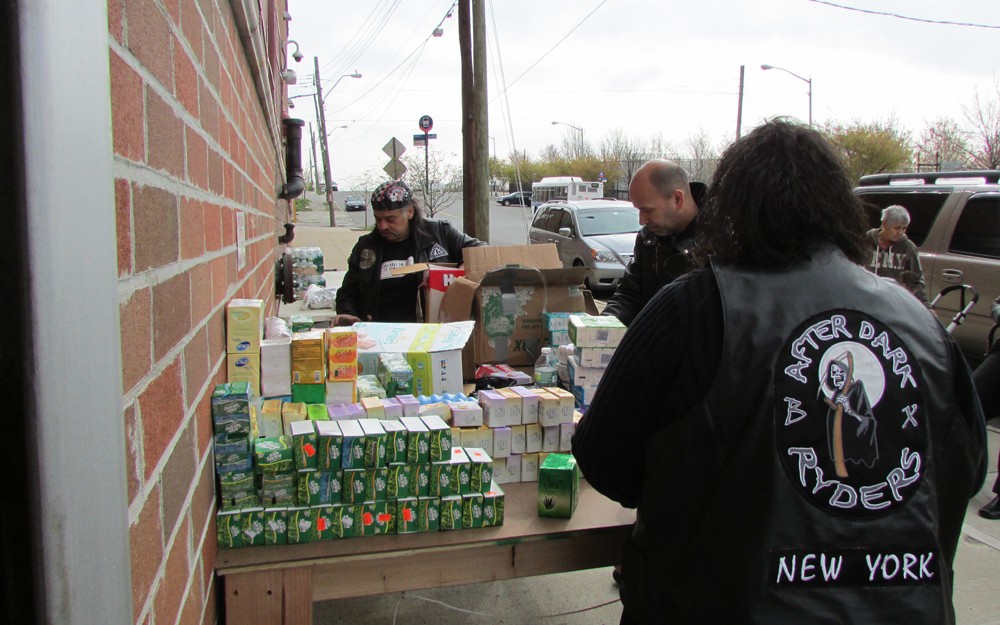
Home: Bronx, New York
Program: U.S. programs
Published May 21, 2013
Small changes matter. That’s the motto of Afterdark Ryders, a motorcycle club and nonprofit organization founded to change lives in their Bronx, New York, community.
Starting in 2008 when the group gave out 350 frozen turkeys with trimmings at Thanksgiving, Afterdark Ryders has gathered donations of food, toys for Christmas, schools supplies, and other items for schools, churches, and community organizations in the Bronx to distribute to children and families in need.
Afterdark Ryders worked directly with World Vision for the first time in April. Members — some wearing vests with the club’s logo on the back — collected 16 boxes of diapers, wipes, toothpaste, and other personal care items for the Bronx warehouse of World Vision’s U.S. Programs.
“More than just a club, we are a strong, supportive family,” says Rafael Pizarro, founder and president of the group, which also includes an auto club and social club. The organization began with 10 members and now has 25 men and women participating, including sanitation and construction workers and security guards.
The group “loves helping the homeless and the less fortunate every chance we can. Afterdark Ryders is based on the presumption that all people are created equal,” Rafael says in his rapid-fire Bronx accent, adding that those undergoing hard times “deserve compassion, empathy, and understanding — not sympathy.”
Afterdark Ryders worked indirectly with World Vision in 2011 when the Bronx group gathered products for Clean the World, a Florida-based charitable organization that collects discarded soap and shampoo from hotels to be recycled. World Vision helps distribute the recycled products worldwide in hygiene kits.
While searching online early this year for another service opportunity, Rafael noticed World Vision’s new Bring It for Kids program, which encourages organizations to collect diapers or school supplies for children and families locally or around the world. World Vision created Bring It for Kids in response to two highly successful diaper drives with the Weyerhaeuser corporation.
World Vision posted information about Bring It for Kids on its U.S. Programs’ website in early February. “Literally the next day, Rafael found us,” says Jen Porter, workplace giving manager for World Vision.
Rafael says he wants to get involved with World Vision after learning that it helped survivors of Superstorm Sandy and others in need. “I became very fond of your organization and the services you provide,” he says. “By working together, we can make a difference in helping others.”
Rafael and Afterdark Ryders are “great to work with,” says Tim Reeve, general manager of World Vision’s programs in greater New York.
For its next project with World Vision, Afterdark Ryders plans to hold a product drive in September, collecting baby supplies for distribution in the Bronx.
“Giving back is what we do,” Rafael says.
His reward for helping those in need? “Honestly? The smiles on their faces,” he says. “I know we did something good. A lot of people don’t have smiles like that. We get a ‘thank you.’ I love to see kids get Christmas toys. At the end of the day, when you think about it, they are the future. I want to change my community.”
Change agents: Ignite F.C.
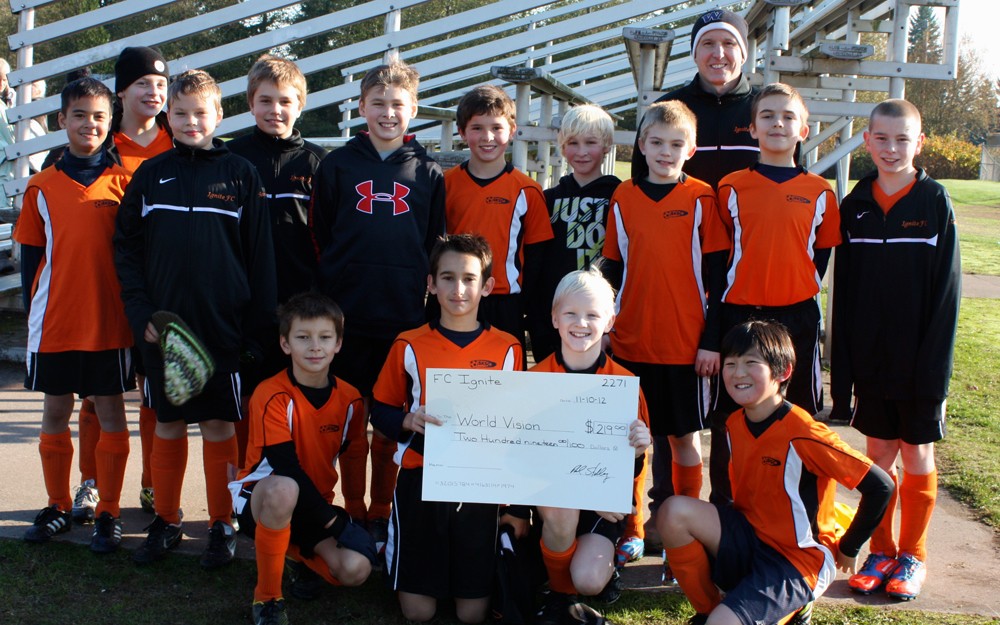
Home: Bothell, Washington
Occupation: Soccer
Program: Gift Catalog
Published April 24, 2013
The boys who play for Ignite F.C. have a special reason to celebrate every time they score a goal. Each time they do, supporters pass a can among their fans to solicit a contribution to the players’ favorite charities. The initials F.C. actually stand for “For Christ,” rather than the traditional “Football Club.”
Last season, Ignite F.C. scored 24 goals, which helped team members raise $219 to purchase Bibles, chickens, and soccer balls through the World Vision Gift Catalog. The items were sent to help families in developing countries. Sweeper Xander Wood, 11, nominated World Vision after his family began sponsoring Keketso Khopho, a child who lives in Lesotho in southern Africa. Xander considers Keketso part of his family and prays for him every night.
Change agents: Small church gives big
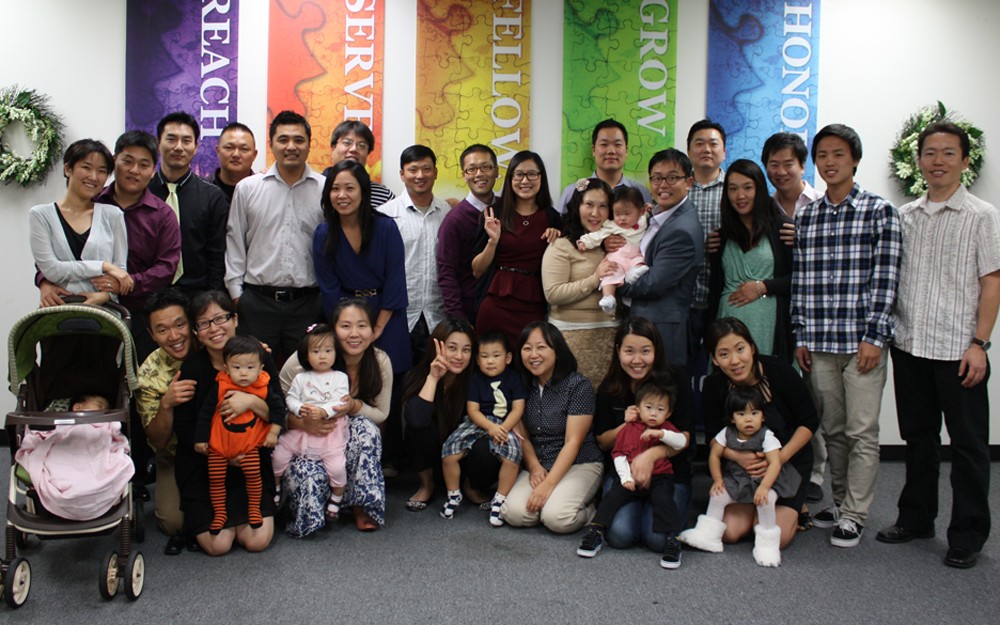
Home: Gardena, California
Program: Gift Catalog
Published April 22, 2013
After learning of the plight of millions of starving people in the Horn of Africa in 2011, a tiny church in Gardena, California, dug deep to give big to the cause.
Many of the 15 young families that make up Cross Connection Community Church sponsor children through World Vision. Each Christmas, the congregation launches a campaign to provide livestock and other animals through the World Vision Gift Catalog. The church also serves its own community through various service projects and outreach events.
As if that wasn’t enough, the couples — all with children younger than 4 — recently collected $40,000 from their personal resources and a Facebook promotion. They gave half to World Vision’s work in the Horn of Africa and the other half to Wycliffe Bible Translators.
The congregation’s generosity is an ongoing expression of its desire to be salt and light in the world.
Pastor Tony Park and some college friends planted the church in 2003, and they stayed together as they married and started families. Tony says his idea of how the church effectively spreads the good news throughout the world has expanded from more traditional “preaching and teaching” to living out the gospel message.
“People in our church are seeing that giving to others in need is part of our responsibility,” says Tony.
When Tony heard about “Journey to Jamaa,” World Vision’s film that tells the story of two young African children who lost their parents, the church hosted an event featuring the film. Seeing the film and learning about the desperate situation of millions of children in the Horn of Africa stirred something in the young parents’ hearts like nothing else had before. “Our babies are precious to us. Hearing these stories of children dying before they reach 5 wasn’t as relevant to us [before] as it is now,” says David Kim, 31. “We became more genuine in supporting these things.”
As they prayed and sought guidance on their response, Tony says they felt prompted to give a double portion by using funds from the church’s savings account, which had accumulated since they launched the church.
“Everyone agreed to give to the Horn of Africa. We sensed that the time was right,” Tony says.
Cross Connection’s gift is a landmark of sorts along its spiritual journey. David says they experienced a strong sense of gratitude to be a part of God’s work in the world. Sacrificial giving is now embedded in the church’s faith expression, demonstrating that size isn’t a factor when it comes to generosity.
Change agents: Word of Life Chapel
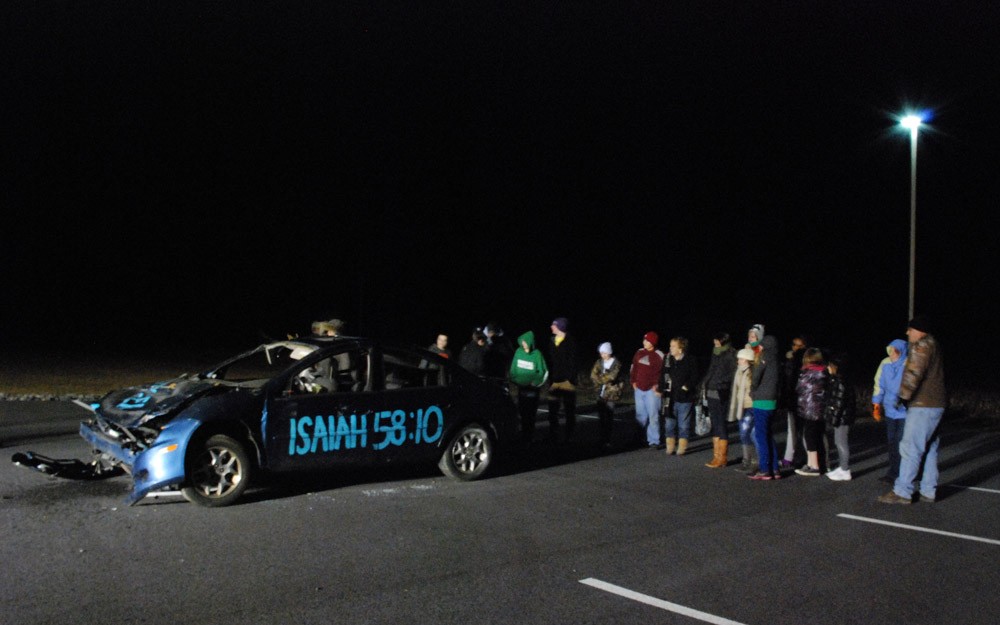
Home: Bainbridge, Pennsylvania
Program: 30 Hour Famine
Published Feb. 21, 2013
The young people of Word of Life Chapel decided to work off some steam on behalf of the world’s poor.
The youth are all involved in the World Vision 30 Hour Famine, in which participants fast for 30 hours to identify with and raise money for the hungry.
To spice things up a bit, they decided to take turns swinging a sledgehammer into a hapless Dodge Neon. For the privilege, those who took a swing were invited to make a donation to the cause.
Church youth leader Ashley Joline says it was a freezing night, but around 30 people turned up for the event, shortly before the national famine weekend.
“By the end of the night, both bumpers were gone, a door was missing, and the dash was shredded,” she says. “It took a pretty good beating.”
The car itself yielded a donation when a nickel flew out of a passenger-side visor.
Ashley said participants took their cue from Isaiah 58:10 — a reference that was emblazoned along the side of the vehicle.
The text reads: “… If you spend yourselves in behalf of the hungry and satisfy the needs of the oppressed, then your light will rise in the darkness.”
Ashley says Word of Life youth typically raise about $10,000 on the famine weekend through fasting and stunts such as the car smashing.
Change agent: Jean Estep
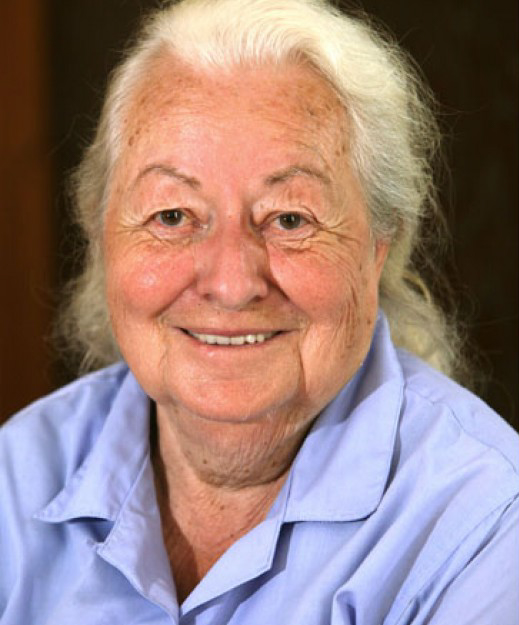
Home: Printer, Kentucky
Occupation: Retired
Program: Gift Planning
Published Oct. 24, 2012
Back in 1984, Jean heard about the devastating famine in Ethiopia. She wanted to help but did not know how — until her church connected her with World Vision. It was the start of a relationship that has lasted almost 30 years.Currently, she sponsors 14-year-old Salissou Issoufa in Niger, another country currently experiencing serious food shortages. She says the Lord has blessed her, and this compels her to give — even beyond her own lifetime. Jean has included a charitable bequest in her will so that when she passes away, her house will be sold and the proceeds donated to the work of World Vision. She says the Lord gave the house to her, and it’s fitting that she can give it back to him.
Currently she sponsors 14-year-old Salissou Issoufa in Niger, another country currently experiencing serious food shortages. She says the Lord has blessed her, and this compels her to give — even beyond her own lifetime. Jean has included a charitable bequest in her will so that when she passes away, her house will be sold and the proceeds donated to the work of World Vision. She says the Lord gave the house to her, and it’s fitting that she can give it back to him.
Change agent: Jacob Froats
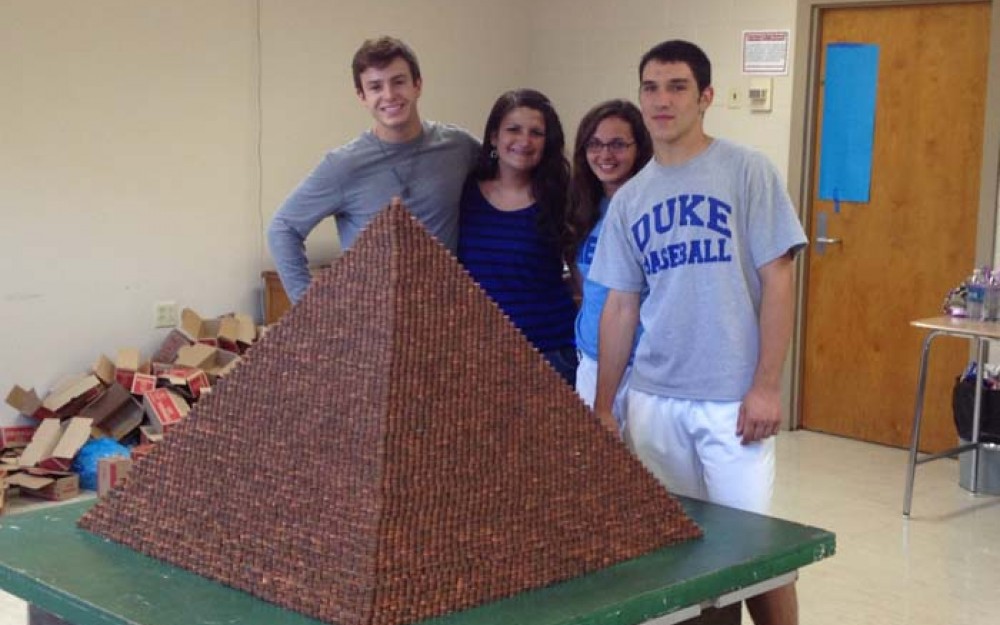
Home: Howland, Ohio
Occupation: High school student
Program: Water, livestock
Published Oct. 23, 2012
Jacob Froats, 17, has had a long-standing interest in breaking the world record for the largest pyramid constructed entirely of pennies.
When his chemistry teacher at Howland High School in Howland, Ohio, created an assignment connected to improving the environment, Jacob realized he might be able to achieve his dream, complete the assignment, and improve the environment for the world’s poor at the same time.
Jacob and classmates, Cody Davis, Jenn Knapp, and Destiny Zunic, proposed to build a pyramid consisting of 500,000 donated pennies. Once completed, they would donate the $5,000 to World Vision to fund water and livestock projects, benefiting impoverished families in the developing world.
The students calculated how many rows of pennies would be required and how much they would weigh. It turned out that the combined weight of the pennies would come to about 3,000 pounds. Jacob enlisted the help of his father to construct a reinforced table to hold the pyramid.
Jacob and the team began building the pyramid in an unused classroom with about 100,000 pennies he had previously collected.
He says the project quickly gathered momentum as the pyramid grew. More than 100 students contributed their own pennies and helped with construction.
Nearby businesses supported the project with donations, and a local financial institution, Seven Seventeen Credit Union, agreed to ship in thousands of dollars in pennies to support the project.
“Everyone thought we were crazy at first, but the idea caught on. Tons of kids helped out on it; it was pretty cool to see,” Jacob says.
The pyramid took about three weeks and 800 man-hours to complete.
Teacher Andrea Ferenac says talking about the project still gives her goosebumps and considers the event one of the highlights of her career. She says it brought students from all walks of life together, forged new friendships, and empowered students to work collaboratively for a worthwhile cause.
“Sometimes you don’t realize how powerful a few individuals can be to make a big difference in a lot of people’s lives,” she says.
Meanwhile, Jacob will submit the pyramid project for inclusion among the Guinness World Records. The current record for a penny pyramid is one consisting of about 300,000 pennies.
Change agents: Davis family
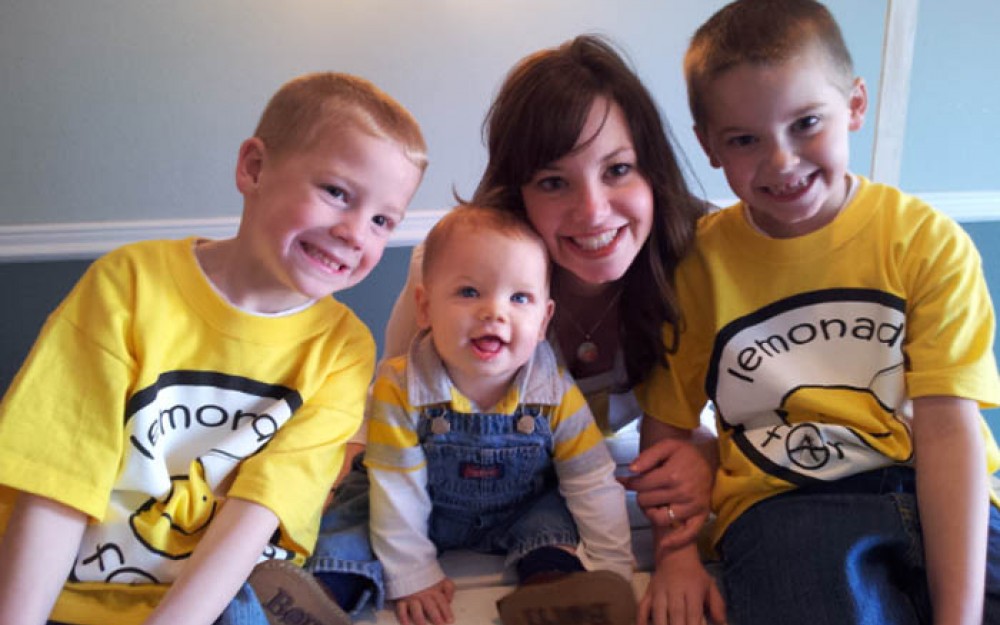
Home: Joplin, Missouri
Church: Pentecostal church of God
Program: Malaria Sunday
Published Aug. 21, 2012
Children dying of malaria left a sour taste in the mouths of Daniel and Rhonda Davis and their sons, 7-year-old Evan and 6-year-old Gideon.
During their church’s Malaria Sunday, the family learned how malaria kills a child about every 60 seconds. Inspired by the fact that just $6 would purchase a net to protect two children living in remote communities from malaria-carrying mosquitoes, the boys dug into their piggy banks.
But that wasn’t enough for Evan, who resolved to raise more money by selling lemonade. With the help of their church and Messenger College students, the family soon launched “Lemonade for Life,” a lemonade-stand fundraiser that to date has raised enough to purchase more than 400 mosquito nets. World Vision will soon deliver these nets to families in need around the world.
Contributors: James Addis, Elizabeth Hendley, Nathalie Moberg, and Kristy J. O’Hara, World Vision staff
